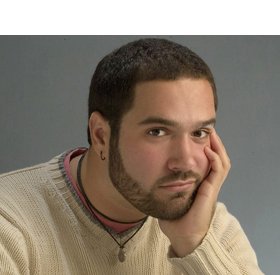March is shaping up to be quite a month for Marco Ramirez. On March 7, the LCT production of his play The Royale opens. On March 18, Netflix’s popular series "Daredevil,” for which Ramirez served as co-showrunner, streams the 13 episodes of its second season. And March 21 is his birthday.
To the last fact I will add only that Ramirez was born and raised in Miami, of Cuban-immigrant parents. The other two bits of March-related information testify to his experience both onstage and onscreen, and relate to the approach he took to the sport at the center of The Royale, which concerns an early-20th-century African-American boxer inspired by the life of the great champion Jack Johnson.
“Onscreen,” Ramirez told me the other day, “you can use editing and swelling music to put you in ring with the boxers. Movies about boxers tend to be about the fight itself and about whether the boxer can make it.” He went on: “In the theater, we have another tradition. We can raise questions about morality, about the circumstances the boxer faces and the choices he makes in response to them.”
Johnson story provides plentiful fodder for Ramirez’s investigation. “It was a spectacular life, with great highs and lows,” the playwright said. “There was the time he spent he jail, the relationships with women, the racism he faced.” What most interested Ramirez, was “how he got the big fight against a white opponent, what happened when he got it, and what happened after.”
Ramirez calls his main character Jay. “I’m neither African-American nor a historian, so I would have felt irresponsible calling him Jack Johnson.” Ramirez also craved more imaginative freedom than a straightforward historical approach might have offered. “All biographical stories, he explained, “tweak real-life events to serve dramatic purposes, but when you present someone as a real person you have an added set of responsibilities.”
As part of his Royale research, Ramirez, who studied playwriting as an undergraduate at NYU and, later, at Juilliard, watched the 2005 Ken Burns documentary, Unforgivable Blackness: The Rise and Fall of Jack Johnson. He also looked at The Great White Hope, the 1970 movie, based on a 1967 play, with Johnson played by James Earl Jones. “I love that play and movie,” Ramirez said. “But when I talked to people about it they tended to remember that it stars the man who later voiced Darth Vader.”
Ramirez based his approach less on the memory of old movies than the example of contemporary celebrities. “I was thinking in part about Kanye West and LeBron James,” said Ramirez, whose favorite sport is basketball. “Kanye and LeBron carved out these big personalities for themselves. So did Jack Johnson.”
As for how to put boxing onstage, Ramirez knew he couldn’t give us the blood-spurting close-ups of the big screen. “I figured that a stream-of-consciousness approach,” he said, “and the use of direct address would be the way to go.” He added: “I was raised on video games, comic books, and TV, but I love the way that theater forces you to use other methods to engage the audience.”
Brendan Lemon is the editor of lemonwade.com.
